Filter by: All OutputsIEC materialsPolicy briefsResearch articlesResearch Briefs
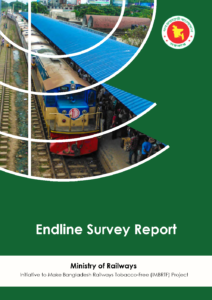
Initiative to Make Bangladesh Railway Tobacco Free-IMBRTF Endline Survey Report
Initiative to Make Bangladesh Railways Tobacco Free (IMBRTF) is an endeavor by the MoR to make railway stations and trains tobacco and smoking free. Under this project, ARK Foundation, has conducted this Endline study in 10 model stations which attempts to understand the overall scenario of the implementation of tobacco laws in the railway stations of Bangladesh after the intervention implementation by Ministry of Railways under this project.
PDF Version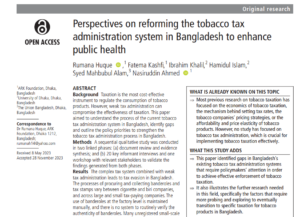
Perspectives on reforming the tobacco tax administration system in Bangladesh to enhance public health
Taxation is the most cost-effective instrument to regulate the consumption of tobacco products. However, weak tax administration can compromise the effectiveness of taxation. This paper aimed to understand the process of the current tobacco tax administration system in Bangladesh, identify gaps and outline the policy priorities to strengthen the tobacco tax administration process in Bangladesh.
PDF Version | HTML Version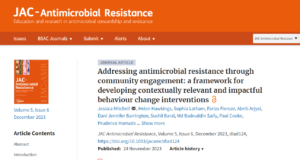
Addressing antimicrobial resistance through community engagement: a framework for developing contextually relevant and impactful behaviour change interventions
Addressing antimicrobial resistance through community engagement: a framework for developing contextually relevant and impactful behaviour change interventions
PDF Version | HTML Version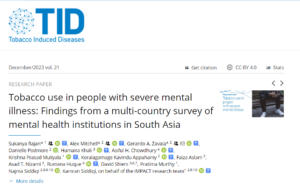
Tobacco use in people with severe mental illness: Findings from a multi-country survey of mental health institutions in South Asia
People with severe mental illness (SMI) tend to die early due to cardiovascular and respiratory diseases, which may be linked to tobacco use. We conducted a multi-country survey of adults with SMI attending mental health facilities in Bangladesh, India, and Pakistan. Using data collected with a standardized WHO STEPS survey tool. Smoking prevalence in men varied by country (Bangladesh 42.8%, India 20.1% and Pakistan 31.7%); <4% of women reported smoking in each country. Among smokers, 29.1% (n=244) made at least one quit attempt in the past year. As observed in high-income countries, we found higher tobacco use in people with SMI, particularly in men compared with rates reported for the general population in South Asia.
PDF Version | HTML Version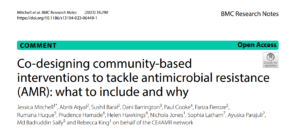
Co-designing community-based interventions to tackle antimicrobial resistance (AMR): what to include and why
Co-designing community-based interventions to tackle antimicrobial resistance (AMR): what to include and why
PDF Version | HTML Version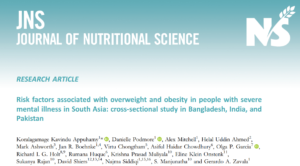
Risk factors associated with overweight and obesity in people with severe mental illness in South Asia: cross-sectional study in Bangladesh, India, and Pakistan
Obesity is one of the major contributors to the excess mortality seen in people with severe mental illness (SMI) and in low- and middle-income countries people with SMI may be at an even greater risk. In this study, we aimed to determine the prevalence of obesity and overweight in people with SMI and investigate the association of obesity and overweight with sociodemographic variables, other physical comorbidities, and health-risk behaviours. This was a multi-country cross-sectional survey study where data were collected from 3989 adults with SMI from three specialist mental health institutions in Bangladesh, India, and Pakistan.
PDF Version | HTML VersionPrevalence of physical health conditions and health risk behaviours in people with severe mental illness in South Asia: multi-country cross-sectional survey
The study aims to estimate the prevalence of physical health conditions and health risk behaviours; assess access to physical healthcare and health risk modification advice in people with severe mental illness attending mental health services in Bangladesh, India and Pakistan; and compare the findings with those of the general population.
PDF VersionPreparedness of Urban Primary Healthcare Centres of Bangladesh in Managing Diabetes Mellitus and Hypertension
This policy brief is based on a study titled “Strengthening the Urban Primary Health Care System to Deliver Essential Non-Communicable Disease Care to the Urban Poor" conducted by ARK Foundation, Bangladesh under the project titled "Community-Led Responsive and Effective Urban Health Systems (CHORUS)" funded by the UK Aid from the UK Government.
PDF VersionInformal Payments as a Barrier for Fruits and Vegetables Retailing in Bangladesh: Findings from a Mixed Method Study
This policy brief is based on a study titled “Vegetables and fruits retailers in two urban areas of Bangladesh: Disruption due to COVID-19 and implications for NCDs” conducted by ARK Foundation, Bangladesh funded by the International Development Research Centre (IDRC), Canada
PDF VersionVegetables and Fruits Retailers in Two Urban Areas of Bangladesh: Disruption due to COVID-19 and Implications for NCDs
This policy brief is based on a study titled “Vegetables and fruits retailers in two urban areas of Bangladesh: Disruption due to COVID-19 and implications for NCDs” conducted by ARK Foundation, Bangladesh funded by the International Development Research Centre (IDRC), Canada.
PDF VersionCost-utility of cytisine for smoking cessation over and above behavioural support in people with newly diagnosed pulmonary tuberculosis: an economic evaluation of a multicentre randomised controlled trial
In 2020, due to the impact of COVID-19 pandemic, the number of newly diagnosed tuberculosis (TB) case notifications saw a big drop from 2019 while the number of people who died from TB increased due to reduced access to services at global, regional and country levels.1 Bangladesh (218 per 100 000 population) and Pakistan (259 per 100 000 population) are among the 16 countries that contributed most to the global shortfall of TB notifications yet they are still on the WHO high-burden countries lists for TB and multidrug-resistant TB or rifampicin-resistant TB.
PDF Version | HTML VersionEffectiveness of interventions to address obesity and health risk behaviours among people with severe mental illness in low- and middle-income countries (LMICs): a systematic review and meta analysis
Effectiveness of interventions to address obesity and health risk behaviours among people with severe mental illness in low- and middle-income countries (LMICs): a systematic review and meta analysis
PDF Version | HTML VersionThe Role of the Private Sector in the COVID-19 Pandemic: Experiences From Four Health Systems
As societies urbanize, their populations have become increasingly dependent on the private sector for essential services. The way the private sector responds to health emergencies such as the COVID-19 pandemic can determine the health and economic wellbeing of urban populations, an effect amplified for poorer communities.
PDF Version | HTML VersionImplementation status of non-communicable disease control program at primary health care level in Bangladesh: Findings from a qualitative research
Bangladesh has 67% of estimated deaths caused by non-communicable diseases (NCDs). The country aimed to reduce NCD-related premature deaths by one-third by 2030. This study aimed to explore the overall implementation status of the NCD control program at the primary health care (PHC) level in Bangladesh, explore the challenges, and identify the way forward for better implementation.
PDF Version | HTML Version
Public Private Partnership in Improving Access and Utilization of Health Care Services: Scopes, Opportunities and Challenges
Improved quality and access to healthcare services are essential for a country’s development. Private sectors like NGOs, for-profit and non-profit organizations have significantly contributed to health by financing and managing healthcare services in different ways. In developing countries, the private sector becomes more critical because, with limited resources, such countries struggle to ensure proper health care for everybody. That is why, the public-private partnership can offer new opportunities by sharing risks, resources and finance to provide healthcare services under certain conditions. This study, therefore, aimed to find out the possibilities, scopes and challenges of public-private partnership (PPP) which will inform a guideline to design and implement such collaboration to improve access to and quality of health.
PDF Version | HTML VersionCovid-19 & Cities Report – Bangladesh
This report presents an overview of the COVID-19 response in the country from February to the End of August 2020. It focuses on the response related to urban health in the country and tries to portray the interaction of different stakeholders and the deciding authorities in Covid-19 management in urban areas.
PDF Version | HTML VersionKnowledge and Response to the COVID-19 Pandemic in People With Severe Mental Illness in Bangladesh and Pakistan: A Cross-Sectional Survey
Mass media were the major source of information about COVID-19. Finances, employment, and physical health were the most frequently mentioned concerns. Overall, participants reported good knowledge and following advice. In Bangladesh, being female and higher levels of health-related quality of life (HRQoL) predicted poor and better knowledge, respectively, while in Pakistan being female predicted better knowledge. Receiving information from television predicted better knowledge in both countries. In Bangladesh, being female, accessing information from multiple media sources, and better HRQoL predicted better practice. In Pakistan, poorer knowledge of COVID-19 prevention measures predicted poorer practice.
PDF Version | HTML VersionThe Complicated Cigarette Tax Structure in Bangladesh is Causing Expansion of the Low-Tier Cigarette Market and Lower Tax Revenue
This policy brief is based on a study titled "Effect of Introducing a New Low-Tier Cigarette Brand on Cigarette Tax Revenue in Bangladesh: Evidence from cigarette sales by British American Tobacco (BAT) in Bangladesh, 2019–2020" conducted by ARK Foundation, Bangladesh
PDF Version | HTML VersionPrice Elasticity of Cigarette Demand: Implications for Cigarette Taxation in Bangladesh
This policy brief is based on a research study titled “Estimating Price Elasticity of Cigarette Demand in Bangladesh Using GATS Data” conducted by Advancement Through Research and Knowledge (ARK) Foundation, Bangladesh.
PDF VersionCigarette Demand Analysis: Bangladesh
This Report was written by Advancement Through Research and Knowledge (ARK) Foundation in Bangladesh. The researchers estimate that the total price elasticity of demand for cigarettes is -0.71. A 10% increase in the price of cigarettes would reduce smoking by 7.1 percent, meaning that cigarette demand is inelastic.
PDF Version | HTML VersionSmoke-free homes: The final frontier
Over 1.2 billion tobacco users worldwide and almost 8 million tobacco-related deaths make tobacco control a public health high priority1 . While the number of smokers has fallen in high-income countries (HICs) in recent years, the number of tobacco users in many low- and middle-income countries (LMICs) has steadily increased2 . In addition to active smoking, inhalation of secondhand smoke (SHS) is a major cause of premature death and disease, especially among women and children.
PDF Version | HTML VersionPolicy priorities for strengthening smokeless tobacco control in Bangladesh: A mixed-methods analysis
Smokeless tobacco (ST) remains poorly regulated in Bangladesh. This study describes the prevalence and trends of ST use in Bangladesh, presents ST-related disease burden, identifies relevant policy gaps, and highlights key implications for future policy and practice for effective ST control in Bangladesh.
PDF Version | HTML VersionAntibiotic practices among household members and their domestic animals within rural communities in Cumilla district, Bangladesh: a cross-sectional survey
Antibiotic resistance is a global threat to human health, and inappropriate use of antibiotics in humans and animals is widely considered to be a key driver of antibiotic resistant infections. Antibiotic use in humans and animals is growing rapidly in low- and, particularly, middle-income countries. However, there is little detailed understanding about practices related to the use of antibiotics in humans and animals within community settings in such countries. Here we aimed to understand the antibiotic practices of rural households across Cumilla district, Bangladesh, in relation to household members and their domestic animals.
PDF VersionInterventions for preventing type 2 diabetes in adults with mental disorders in low‐ and middle‐income countries
We searched the medical literature to review the evidence on the effects of pharmacological (drug), behavioural (behaviour change) and organisational (delivery of health care) interventions for the prevention of type 2 diabetes among people with mental disorders in low‐ and middle‐income countries (LMICs). Type 2 diabetes is a serious health condition that may develop when the body can no longer properly use a hormone called insulin. There are many reasons why a person may develop type 2 diabetes, including being overweight, having high blood pressure, not getting enough exercise, having a family history of the disease, and several other possible risk factors. We included randomized controlled trials (RCTs) published up to our search date, 20 February 2020.
PDF VersionHow do patient feedback systems work in low-income and middle-income countries? Insights from a realist evaluation in Bangladesh
Well-functioning patient feedback systems can contribute to improved quality of healthcare and systems accountability. We used realist evaluation to examine patient feedback systems at health facilities in Bangladesh, informed by theories of citizenship and principal–agent relationships.
PDF VersionSmoking behaviours and indoor air quality: a comparative analysis of smoking-permitted versus smoke-free homes in Dhaka, Bangladesh
A cross-sectional study was conducted among households with at least one resident smoker. We inquired whether smoking was permitted inside the home (smoking-permitted homes, SPH) or not (smoke-free homes, SFH), and measured indoor PM2.5 concentrations using a low-cost instrument (Dylos DC1700) for at least 22 hours.
PDF VersionPublic Private Partnership in Improving Access and Utilization of Health Care Services: Scopes, Opportunities and Challenges
The brief is based on the study aimed to find out the possibilities, scopes and challenges of public-private partnership (PPP) in health. The findings of the research will inform necessary elements to consider for developing guidelines and strategies to plan and implement PPP in the Ministry of health and family welfare (MOHFW).
PDF VersionTaxation on Sugar-Sweetened Beverages (SSBs) in Bangladesh: What should we do?
The key focus of this policy brief is to present the gaps in the existing taxation system of sugar-sweetened beverages (SSBs), and outline the actions that need to be adopted to improve the SSB taxation in Bangladesh.
PDF VersionCytisine for smoking cessation in patients with tuberculosis: a multicentre, randomised, double-blind, placebo-controlled phase 3 trial
Smoking cessation is important in patients with tuberculosis because it can reduce the high rates of treatment failure and mortality. We aimed to assess the effectiveness and safety of cystine as a smoking cessation aid in patients with tuberculosis in Bangladesh and Pakistan.
PDF VersionPrevalence of physical health conditions and health risk behaviours in people with severe mental illness in South Asia: protocol for a cross-sectional study (IMPACT SMI survey)
PDF VersionBehavioural activation therapies for depression in adults with non-communicable disease (protocol)
PDF VersionThe safety, effectiveness and cost-effectiveness of cytisine in achieving six-month continuous smoking abstinence in tuberculosis patients – protocol
PDF VersionUsing behaviour change theory to train health workers on tobacco cessation support for tuberculosis patients – a mixed methods study in Bangladesh, Nepal and Pakistan
Low- and middle-income countries (LMICs) are disproportionately impacted by interacting epidemics of tuberculosis (TB) and tobacco consumption. The TB and Tobacco Consortium undertook research in South Asia to understand factors affecting TB health workers’ delivery of tobacco cessation behavioural support, and subsequently developed a training package for LMICs. Using the “capability, opportunity, and motivation as determinants of behaviour” (COM-B) framework to understand any issues facing health worker.
PDF VersionSmoking prevalence among tuberculosis patients: A cross-sectional study in Bangladesh and Pakistan
Smoking has a negative impact on TB outcomes. In this study it was estimated that the proportion of TB patients who smoke and are willing to quit in two high TB burden countries, Bangladesh and Pakistan.
PDF VersionCommunity engagement interventions for communicable disease control in low- and lower- middle-income countries: a systematic review
Community engagement (CE) interventions include a range of approaches to involve communities in the improvement of their health and wellbeing. A qualitative synthesis process enabled identification of mechanisms of effect and influencing factors.
PDF VersionA process of developing a sustainable and scalable approach to community engagement – community dialogue approach for addressing the drivers of antibiotic resistance in Bangladesh
Community engagement approaches that have impacted on health outcomes are often time intensive, small-scale and require high levels of financial and human resources. This study explores the process of developing an embedded approach to community engagement taking the global challenge of antibiotic resistance as an example.
PDF VersionIntegrating depression care within NCD provision in Bangladesh and Pakistan: a qualitative study
Co-morbidity of depression with other non-communicable diseases (NCDs) worsens clinical outcomes for both conditions. Low- and middle-income countries need to strengthen mechanisms for detection and management of co-morbid depression within NCDs. The Behavioural Activation for Comorbid Depression in Non-communicable Disease (BEACON) study explored the acceptability and feasibility of integrating a brief depression intervention (behavioural activation, BA) into NCD services in healthcare facilities in Bangladesh and Pakistan.
PDF VersionA Policy Brief on COVID-19 and Tobacco
This policy briefing is informed by: a stakeholder consultation via an online survey, and face to face or telephone interviews; a rapid literature review; and a desk based mapping to identify any relevant unpublished data sources such as government reports and online print press.
PDF VersionEstimating the Magnitude of Illicit Cigarette Trade in Bangladesh: Protocol for a Mixed-Methods Study
he illicit tobacco trade undermines the effectiveness of tobacco tax policies; increases the availability of cheap cigarettes, which, in turn, increases tobacco use and tobacco related deaths; and causes huge revenue losses to governments. There is limited evidence on the extent of illicit tobacco trade particularly cigarettes in Bangladesh. The paper presents the protocol for a mixed-methods study to estimate the extent of illicit cigarette trade in Bangladesh.
PDF Version“Death is a better option than being treated like this”: a prevalence survey and qualitative study of depression among multi-drug resistant tuberculosis in-patients
Understanding of the relationship between multi-drug resistant tuberculosis and mental health is limited. With growing prevalence of multi-drug resistant tuberculosis, addressing mental ill-health has potential to improve treatment outcomes and well-being. In several low and middle-income contexts hospitalisation during treatment is common. Understanding of the impact on mental ill-health are required to inform interventions for patients with multi-drug resistant tuberculosis. Our aim was to identify the prevalence of comorbid depression among in-patients being treated for multi-drug resistant tuberculosis and to explore their experiences of comorbid disease and the care they received in a large specialist chest hospital in Dhaka, Bangladesh.
PDF VersionHealth system responsiveness: What ‘COVID-19’ reminds us?
Health systems in both developed and developing countries are now struggling to respond to the challenges posed by COVID-19. As of 4th April 2020, 205 countries and territories have been affected by COVID-19 with more than 11 lakh cases and 62,376 deaths globally. Though the number of detected cases and mortality are relatively low in Bangladesh compared to many other countries, we may have to think about how our health system should respond to address the challenges of such pandemic now and in future... To download the full report, click the button below.
PDF VersionPrevalence of Eye Problems among Young Infants of Rohingya Refugee Camps: Findings from a Cross-Sectional Survey
Early detection of pediatric eye problems can prevent future vision loss. This study was to estimate the prevalence of common eye problems among infants born in a resource-constrained emergency setting with a broader aim to prevent future vision loss or blindness among them through early detection and referral.
PDF VersionIntegrating tobacco cessation within the TB programme: Findings from the ‘TB & Tobacco’ study
This policy brief is focusing on the key messages and recommendations based on the findings from 'TB & Tobacco' Study which showed that brief behavioural support counselling can help TB patients quit tobacco effectively to improve their treatment outcome and reduce the mortality rate due to TB in Bangladesh
PDF Version | HTML VersionTraining Videos on Tobacco Cessation for DOTS Providers
HTML VersionChildren Learning About Secondhand Smoke (CLASS II): protocol of a pilot cluster randomised controlled trial
Exposure to secondhand smoke (SHS) increases children’s risk of acquiring chest and ear infections, tuberculosis, meningitis and asthma. Smoking bans in public places (where implemented) have significantly reduced adults’ exposure to SHS. However, for children, homes remain the most likely place for them to be exposed to SHS. Additional measures are therefore required to protect children from SHS. In a feasibility study in Dhaka, Bangladesh, we have shown that a school-based smoke-free intervention (SFI) was successful in encouraging children to negotiate and implement smoking restrictions in homes. We will now conduct a pilot trial to inform plans to undertake a cluster randomised controlled trial (RCT) investigating the effectiveness and cost-effectiveness of SFI in reducing children’s exposure to SHS
PDF VersionIntegrated Prevention and Management of Selected Acute and Chronic Illness (IPMSACI) – Job Aid (Bangla Version)
This quick-glance guide is designed to help Community Health Care Providers (CHCPs) prevent and manage a range of acute and chronic illnesses in adults.
PDF VersionIn-country public-private partnerships hold the key to promoting inclusiveness in Dutch trade and international cooperation agenda
This policy contribution was developed in response to a Dutch Ministry of Foreign Affairs online consultation. It advocates the extension of the public-private partnership (PPP) model into health service delivery and draws on our work with private and public healthcare providers in Bangladesh.
PDF VersionInterventions for preventing type 2 diabetes in adults with mental disorders in low and middle income countries
This is a protocol for a Cochrane Review (Intervention). The objectives are as follows: To assess the effects of pharmacological, behaviour change, and organisational interventions compared to comparator intervention in preventing diabetes among people with mental illness in LMICs.
PDF VersionIntegrating a diabetes and hypertension case management package within primary health care: a mixed methods feasibility study in Bangladesh
Almost three quarters of non-communicable disease (NCD) deaths, and 82% of premature NCD deaths, occur in low- and middle-income countries. Bangladesh has an estimated 7 million hypertensives and 10 million diabetics, and primary care is struggling to respond. Our aim was to develop and support implementation of a diabetes and hypertension case management package, and assess its appropriateness, feasibility and acceptability in two NCD clinics within two primary-care centres in Bangladesh
PDF Version | HTML VersionProtocol for a mixed-methods realist evaluation of a health service user feedback system in Bangladesh
Responsiveness to service users’ views is a widely recognised objective of health systems. A key component of responsive health systems is effective interaction between users and service providers. Despite a growing literature on patient feedback from high-income settings, less is known about effectiveness of such systems in low-income and middle-income countries.
PDF Version | HTML VersionBehaviour change interventions to reduce second-hand smoke exposure at home in pregnant women – a systematic review and intervention appraisal
Second-hand smoke (SHS) exposure during pregnancy is associated with poor pregnancy and foetal outcomes. Theory-based behaviour change interventions (BCI) have been used successfully to change smoking related behaviours and offer the potential to reduce exposure of SHS in pregnant women. Systematic reviews conducted so far do not evaluate the generalisability and scalability of interventions. The objectives of this review were to (1) report the BCIs for reduction in home exposure to SHS for pregnant women; and (2) critically appraise intervention-reporting, generalisability, feasibility and scalability of the BCIs employed.
PDF Version | HTML VersionMuslim Communities Learning About Second-hand Smoke in Bangladesh (MCLASS II) study protocol for a cluster randomised controlled trial of a community based smoke-free homes intervention, with or without Indoor Air Quality feedback
Second-hand smoke (SHS) is a serious health hazard costing 890,000 lives a year globally. Women and children in many economically developing countries are worst affected as smoke-free laws are only partially implemented and homes remain a major source of SHS exposure. There is limited evidence on interventions designed to reduce SHS exposure in homes, especially in community settings. Following a successful pilot, a community-based approach to promote smoke-free homes in Bangladesh, a country with a strong commitment to smoke-free environments but with high levels of SHS exposure, will be evaluated. The study aims to assess the effectiveness and cost-effectiveness of a community-based intervention, Muslims for better Health (M4bH), with or without Indoor Air Quality (IAQ) feedback, in reducing non-smokers’ exposure to SHS in the home. To read more, choose either of the two buttons below.
PDF Version | HTML VersionEmbedded health service development and research: why and how to do it (a ten-stage guide)
In a world of changing disease burdens, poor quality care and constrained health budgets, finding effective approaches to developing and implementing evidence-based health services is crucial. Much has been published on developing service tools and protocols, operational research and getting policy into practice but these are often undertaken in isolation from one another. This paper, based on 25 years of experience in a range of low and middle income contexts as well as wider literature, presents a systematic approach to connecting these activities in an embedded development and research approach. This approach can circumvent common problems such as lack of local ownership of new programmes, unrealistic resource requirements and poor implementation. To read more, choose either of the two buttons below.
PDF Version | HTML VersionChildren Learning About Second-hand Smoke (CLASS II): a pilot cluster randomised controlled trial
Children exposed to secondhand smoke (SHS) are at increased risk of respiratory illnesses. We piloted a Smoke Free Intervention (SFI) and trial methods before investigating its effectiveness and cost-effectiveness in primary school children. To read the article, choose one of the following buttons below.
PDF Version | HTML VersionProtocol for the mixed-methods process and context evaluation of the TB & Tobacco randomised controlled trial in Bangladesh and Pakistan: a hybrid effectiveness–implementation study
Tuberculosis (TB) remains a significant public health problem in South Asia. Tobacco use increases the risks of TB infection and TB progression. The TB& Tobacco placebo-controlled randomised trial aims to (1) assess the effectiveness of the tobacco cessation medication cytisine versus placebo when combined with behavioural support and (2) implement tobacco cessation medication and behavioural support as part of general TB care in Bangladesh and Pakistan. This paper summarises the process and context evaluation protocol embedded in the effectiveness–implementation hybrid design. To read the article, please choose either of the following buttons.
PDF Version | HTML VersionSecondhand Smoke Exposure in Primary School Children: A Survey in Dhaka, Bangladesh
We report on second-hand smoke (SHS) exposure based on saliva cotinine levels among children in Bangladesh—a country with laws against smoking in public places. To read the article, please download the PDF.
PDF VersionImproving the quality of care at community clinics in rural Bangladesh through new approaches
Our research shows that there can be substantial benefits to healthcare provision if countries develop tailored materials and training packages for lower-level health workers. Regular refresher training for community health care providers, specially-adapted job aids and help to improve communication skills are among the key recommendations from our study.
PDF Version | HTML VersionHow can public-private partnerships enhance the use of long acting contraceptive methods in Bangladesh?
Our findings show the public-private partnership model is acceptable and appropriate and increases the use of long acting contraceptive methods. Our recommendations include the need for hands-on training of private medical practitioners (PMPs) to improve their knowledge of family planning services and methods. Proper tracking and disbursement of incentives to PMPs is needed to help keep them motivated and actively referring to family planning centres.
PDF Version | HTML Version“He Doesn’t Listen to My Words at All, So I Don’t Tell Him Anything”—A Qualitative Investigation on Exposure to Second Hand Smoke among Pregnant Women, Their Husbands and Family Members from Rural Bangladesh and Urban India
Second hand smoke (SHS) exposure during pregnancy is associated with poor pregnancy and fetal outcomes. To design interventions to reduce exposure, an in depth understanding of social and cultural factors of smoking behavior at home is important, especially in South Asia where SHS exposure is high. This study aimed to explore pregnant women’s, their husbands’ and other family members’ knowledge, attitudes and practices regarding home SHS exposure. Semi-structured interviews were conducted with 33 participants in Comilla, Bangladesh and 31 in Bangalore, India (36 pregnant women, 18 husbands, and 10 family members). Data were analyzed using the Framework approach. Husbands smoked in various living areas inside the home, often in the presence of their pregnant wives. Most had never tried to stop smoking at home. Knowledge of the risks was generally poor. Most women had repeatedly asked their husband to smoke outside with little success and only few family members had reprimanded the husbands. Husbands who had stopped did so because of requests from children and their mother. Potential strategies to decrease SHS exposure at home were educating the husband about risks and supporting the pregnant women in negotiation. Interventions must also enlist family support to enhance the woman’s self-efficacy. To read whole article, please choose either of the following buttons.
PDF Version | HTML VersionImproving the quality of care of children in community clinics – an intervention and evaluation in Bangladesh
Community health care providers (CHCPs) in 40 rural community clinics of Comilla district, Bangladesh, were trained using a newly developed case-management job aid based on the World Health Organization Integrated Management of Childhood Illness and a communication guide. To read the whole article, please download the PDF.
PDF VersionIntegrated Prevention and Management of Selected Acute and Chronic Illness (IPMSACI) – Job Aid (English Version)
This quick-glance guide is designed to help Community Health Care Providers (CHCPs) prevent and manage a range of acute and chronic illnesses in adults.
PDF VersionImproving access to TB care for garment factory workers using Public-Private Partnerships in Bangladesh
This brief outlines the challenges and impact of our research into providing garments factory workers with free TB treatment using Public Private Partnerships.
PDF Version | HTML VersionIntegrated Management of Childhood Illness (IMCI) Job Aid – English version
This job aid is an English translation of a Bangla quick-glance guide designed to help Community Health Care Providers (CHCPs) diagnose and treat six major diseases.
PDF VersionIntegrated Management of Childhood Illness (IMCI) Job Aid – Bangla version
This job aid is the Bangla version of a tool distributed among 14,000 Community Health Care Providers (CHCPs) in Bangladesh. It reminds CHCPs what to ask and look for in the diagnosis and treatment of six major diseases.
PDF VersionUsing public-private partnerships to influence healthcare policy and practice in Bangladesh
A case study exploring how public-private partnerships are being used to formalise and improve the referral process between Private Medical Practitioners (PMPs) and TB diagnosis centres in Bangladesh. Not only is this model helping to significantly increase TB referral rates among large workforces in garment factories, it is now being scaled up to improve access to family planning services for urban poor populations.
PDF Version | HTML VersionChildren Learning About Secondhand Smoke (CLASS II) – protocol of a pilot cluster randomised controlled trial
Exposure to secondhand smoke (SHS) increases children’s risk of acquiring chest and ear infections, tuberculosis, meningitis and asthma. Smoking bans in public places (where implemented) have significantly reduced adults’ exposure to SHS. However, for children, homes remain the most likely place for them to be exposed to SHS. Additional measures are therefore required to protect children from SHS. In a feasibility study in Dhaka, Bangladesh, we have shown that a school-based smoke-free intervention (SFI) was successful in encouraging children to negotiate and implement smoking restrictions in homes. We will now conduct a pilot trial to inform plans to undertake a cluster randomised controlled trial (RCT) investigating the effectiveness and cost-effectiveness of SFI in reducing children’s exposure to SHS. To read more, please download the PDF.
PDF VersionInfluencing TB policy and practice in Bangladesh using a Public-Private Mix approach
Bangladesh is among the top 10 high TB burden countries. This policy brief describes how the involvement of private medical practitioners (PMPs) can substantially increase case finding of infectious TB cases. We found that the 'public-private mix' (PPM) model is highly effective in improving access to and quality of TB care in urban settings and that appropriate protocols, tools and training materials have considerably improved the quality of TB reporting.
PDF Version | HTML VersionSmokeless tobacco supply chain in South Asia – A comparative analysis using the WHO Framework Convention on Tobacco Control
Most South Asian countries are signatories to the WHO Framework Convention for Tobacco Control (FCTC). However, there is little information on the extent to which FCTC standards are effectively implemented for controlling smokeless tobacco (SLT)—used by over 250 million people in the region. We assessed the feasibility of a novel approach based on interviewing the key actors of SLT supply chain and analyzing its fndings using standards set by FCTC. To read more, please download the PDF.
PDF VersionChildren Learning About Second-Hand Smoking – A Feasibility Cluster Randomized Controlled Trial
Exposure to second-hand smoke is a threat to children’s health. We developed a school-based smoke-free intervention (SFI) to support families in implementing smoke-free homes in Bangladesh, and gathered preliminary evidence of its effectiveness. To read the article, please download the PDF.
PDF VersionSmokeless tobacco Control policies in South Asia – A Gap Analysis and Recommendation
Almost a fifth of the world’s tobacco is consumed in smokeless form. Its consumption is particularly common in South Asia, where an increasing array of smokeless tobacco (SLT) products is widely available. Mindful of the growing public health threat from SLT, a group of international academics and policy makers recently gathered to identify policy and knowledge gaps and proposed strategies to address these. To read more, please download the PDF.
PDF VersionChildren’s exposure to second-hand smoke at home in Bangladesh – a community survey
In Bangladesh, second-hand smoke (SHS) is recognised as a principal source of indoor air pollution and a major public health problem. However, we know little about the extent to which people are aware of the risks of second-hand smoking, or restrict smoking indoors or in the presence of children. We report findings of a community survey exploring these questions. To read more, please download the PDF.
PDF VersionDo People Restrict Smoking in Public Places. Lessons Learnt from Four Districts in Bangladesh.
This paper analyses the knowledge and attitude of people regarding smoking restriction in public places under Tobacco Control Act-2005. To read the article, please download the PDF.
PDF VersionEffectiveness of involving the private medical sector in the National TB Control Programme in Bangladesh, evidence from mixed methods
In Bangladesh, private healthcare is common and popular, regardless of income or area of residence, making the private sector an important player in health service provision. Although the private sector offers a good range of health services, tuberculosis (TB) care in the private sector is poor. We conducted research in Dhaka, between 2004 and 2008, to develop and evaluate a public–private partnership (PPP) model to involve private medical practitioners (PMPs) within the National TB Control Programme (NTP)’s activities. Since 2008, this PPP model has been scaled up in two other big cities, Chittagong and Sylhet. This paper reports the results of this development, evaluation and scale-up. To read the whole article, please download the PDF.
PDF VersionTuberculosis in the workplace – developing partnerships with the garment industries in Bangladesh
We used operational research to develop and evaluate a mechanism for effective and sustainable TB control in workplaces in three areas of Dhaka, Bangladesh. Strategies, protocols, guides and tools were developed with stakeholders. We assessed the impact of the project using quantitative and qualitative measures: changes in TB outcomes were calculated using standard indicators based on factory and DOTS centre records; changes in TB care-seeking behaviour were assessed using qualitative in-depth interviews with factory managers and medical personnel, and focus group discussions with factory workers, including TB patients. To read the whole article, please download the PDF.
PDF VersionPublic-Private Partnership for TB Control in Bangladesh- Role of Private Medical Practitioners in the Management of TB patients
Despite enormous efforts, Bangladesh has one of the highest burdens of tuberculosis (TB) in the world. Treatment in the private sector is common and popular among TB patients in South Asian countries, including Bangladesh, even though the quality of diagnosis and treatment of TB patients has been shown to be poor in several such countries. The Bangladesh National Tuberculosis Programme (NTP) has recently shown considerable interest in exploring policy options to address this problem. Consequently, the NTP and non-governmental organization (NGO) partners planned to develop a public-private partnership (PPP) model for effective involvement of private medical practitioners (PMPs) in TB control. However, there was a lack of solid data on TB case management practice by PMPs, which was needed to appraise the potential role and contribution of PMPs in TB control. The purpose of the study is therefore to assess the knowledge, attitudes, and practices of PMPs on TB control in an urban setting in Bangladesh in order to inform development of a public-private collaboration model. To Read more, please download the PDF.
PDF VersionChange Management and the Health Sector of Bangladesh A review of Key policy Issues
Managing change or change IIwlwgelllent is an inel,itable part of anv organi::.ation. Health sector. like any other organi::,ation. also fi:lces continuOliS changes. which take place in the fi:Jrln of policv change and !lealth sector reforms. Since independence Bangladesh health sector has IIndergone various changes maillly dlle to changes in its objectil'es. Hown'C!', these changes. cOlild nor bring expected or targeted resll!ts mainlv due to inefficiency in /lulizaging change. Effecrive JIlanageJllellt (){ change is essential for rhe sector, {l/Id ignoring this aspect is making objectives IIn.fidjilled and resollrces unlltilized. This paper is an attempt ro aid the health JIlanagers ro better manage the health sector 1'0 rhat they take out the desired results as planned. To read more, please download the PDF.
PDF Version
